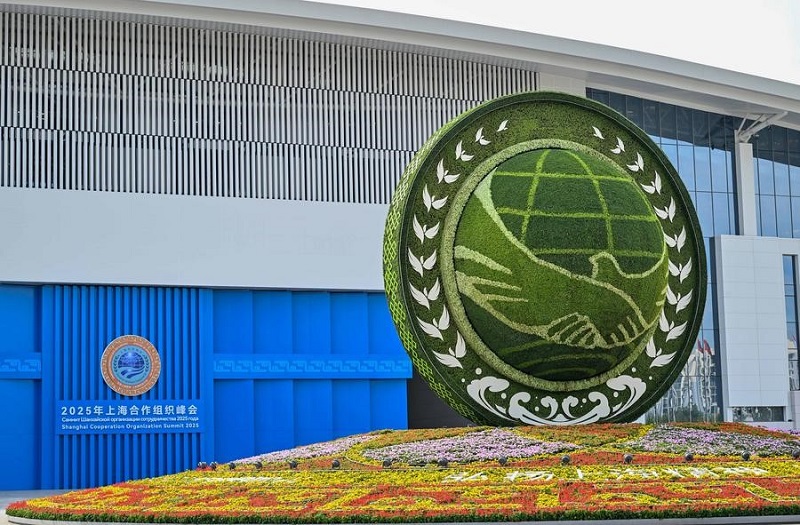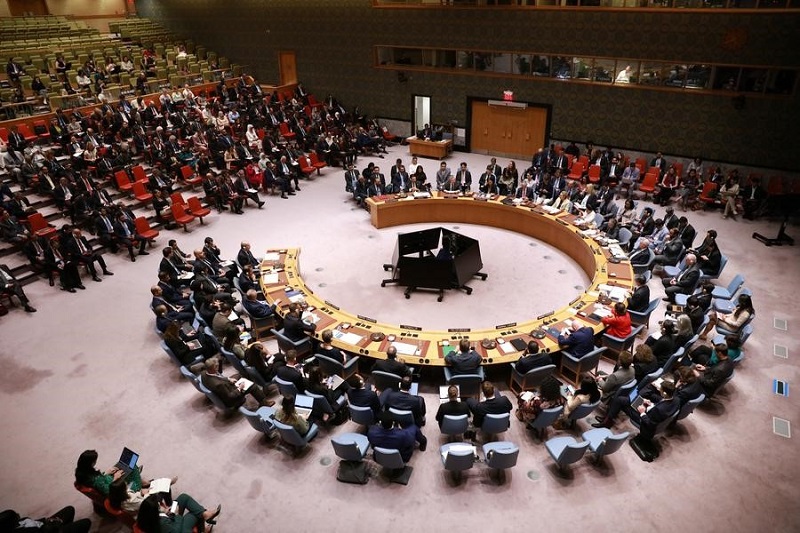Eighty years ago, the international community, reflecting deeply on the painful lessons of the two devastating world wars, established the United Nations, ushering in a new chapter of global governance and making historic contributions to maintaining world peace and development. Eighty years later, while the historical trends of peace, development, cooperation, and mutual benefit remain unchanged, the Cold War mentality – hegemonism and protectionism – continue to haunt the world, as Chinese President Xi Jinping pointed out at the “Shanghai Cooperation Organization Plus” Meeting on September 1. As new threats emerge and challenges increase, the world finds itself in a new period of turbulence and transformation. Global governance has come to a new crossroads, Xi observed.

This photo taken on Aug. 30, 2025 shows an exterior view of the main venue of the Shanghai Cooperation Organization (SCO) Summit 2025 in Tianjin, north China. (Xinhua/Sun Fanyue)
At the meeting, President Xi proposed the Global Governance Initiative (GGI), with the aim to work with all countries for a more just and equitable global governance system and advance toward a community with a shared future for humanity. The initiative outlines five core principles: adhering to sovereign equality, abiding by international rule of law, practicing multilateralism, advocating the people-centered approach, and focusing on taking real actions.
“The GGI calls for the world to take real actions in addressing the prevailing woes derailing global governance,” Ong Tee Keat, former Malaysian minister of transport, said in an interview with the Global Times. “It’s not that the major shortcomings remain unidentified, but it’s the lack of collective global resolve in resetting the skewed order for fear that the reigning hegemon might have its primacy hamstrung,” he added.
This urgency is amplified by a growing deficit of trust and multilateral cooperation. Power dynamics have shifted dramatically since the UN’s founding, with emerging economies rightfully demanding a greater voice and more representative structures. To remain relevant and effective, global governance must evolve to be more inclusive, equitable, and responsive. Reform is thus imperative to bridge the gap between the governance architecture and the contemporary realities of a multipolar world.
The pressing issues of our time, from mitigating climate disaster to managing the risks of artificial intelligence and preventing future pandemics, can only be solved through coordinated, multilateral action. On this 80th anniversary, the international community has a profound responsibility to reinvigorate the spirit of cooperation upon which the UN was founded. Thus, there is a critical need to courageously advance reforms to make global governance institutions more effective and representative, thereby building a more resilient, peaceful, and sustainable world for generations to come.
The GGI is particularly timely, offering China’s approach to safeguarding the international order and improving global governance. It charts the right course for cooperation to address the global governance deficit and respond to the challenges of our times.
The GGI, grounded in the broader context of once-in-a-century transformations, is an apt response to the pressing questions of our times and the international community’s universal call for fairness and justice. It systematically answers the questions of “what kind of global governance system to build and how to reform and improve global governance,” as noted pertinently by the President of the China Institute of Contemporary International Relations Fu Xiaoqiang in an article published by Global Times. As President of Belarus Alexander Lukashenko pointed out, the five core principles of the GGI are precisely the key to solving the problems existing in the current international mechanisms.

This photo taken on Sept. 11, 2025 shows an emergency meeting of the Security Council at the UN headquarters in New York. (Xinhua/Xie E)
The initiative is deeply anchored in the purposes and principles of the UN Charter. For 80 years, the UN-centered international system and the international order based on international law have contributed historically to world peace and development.
However, in recent years, certain countries, seeking to preserve and perpetuate their own hegemony, have aggressively pushed for major-power competition on the international stage, pursued unilateralism, protectionism, and power politics, and wantonly undermined the authority of the UN. Humanity once again faces choices between peace and war, dialogue and confrontation, and win-win cooperation and zero-sum games.
President Xi incisively noted that the various instances of confrontation and injustice in today’s world occur not because the purposes and principles of the UN Charter are outdated, but precisely because they have not been effectively fulfilled.
The proposal of the GGI is precisely to firmly safeguard the status and authority of the UN, unwaveringly uphold the purposes and principles of the UN Charter, maintain the authority of international rule of law, and stand on the right side of history and human progress.
It is crucial to understand that the GGI is not about starting over or creating a completely new system, but about innovating and improving the existing framework. Its purpose is to steer the global governance system toward a more just and equitable direction, ultimately better benefiting people in all nations.
The GGI synergizes powerfully with the three other global initiatives China has proposed: the Global Development Initiative (GDI), Global Security Initiative (GSI), and Global Civilization Initiative (GCI). Together, they form a coherent framework for international cooperation across the dimensions of development, security, civilization, and governance, injecting stability and certainty into a turbulent world.
As Ong Tee Keat observed, “The GGI presents a multi-dimensional agenda for resetting global governance with actionable and deliverable initiatives which are entailed in the GDI, GSI, and GCI.”
These four initiatives embody China’s concrete efforts to turn the vision of a community with a shared future for humanity into reality.
Robert Lawrence Kuhn, a renowned American expert on China, highlighted that President Xi’s vision for a community with a shared future for humanity exemplifies equality and equity among all nations and peoples. “It is a big vision that balances each country’s individual responsibility to care for all its own citizens and all countries’ collective responsibility to care for all citizens of the world,” Kuhn stated.